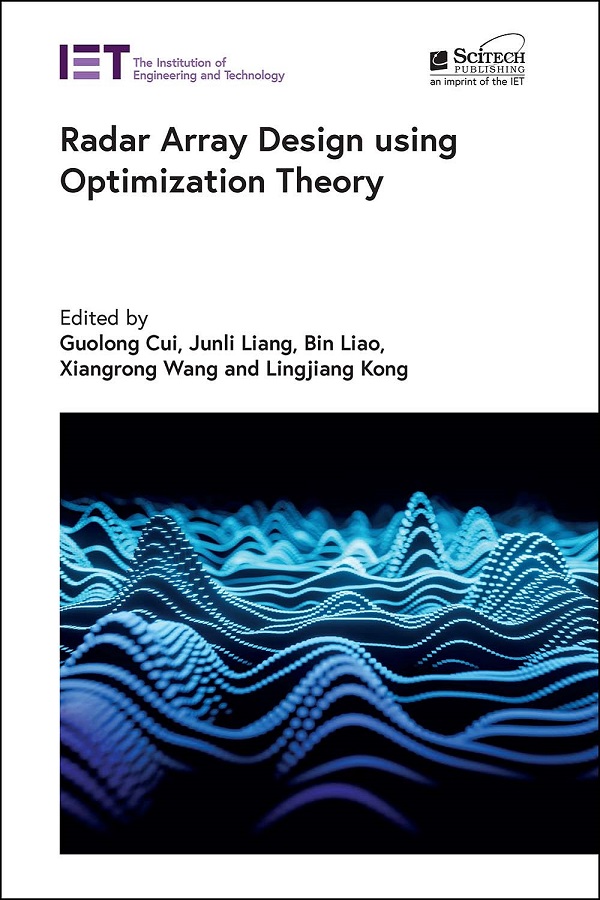- Agricultural Engineering and Technology
- Applied Physics
- Built Environment
- Computing and Networks
- Control, Robotics and Sensors
- Electrical Regulations
- Electromagnetics and Radar
- Energy Engineering
- Healthcare Technologies
- History and Management of Technology
- IET Codes and Guidance
- Manufacturing
- Materials, Circuits and Devices
- Model Forms
- Security
- Telecommunications
- Transportation

Radar Array Design using Optimization Theory
Edited by Guolong Cui, Junli Liang, Bin Liao, Xiangrong Wang, Lingjiang Kong
Radar array design aims at shaping a specific transmit/receive beampattern through optimizing array geometry, transmit waveform, and transmit/receive weight vectors. It is a hot topic among the scientific and industrial communities due to the advent of modern digital arrays with multiple digital transmit and receive channels, arbitrary digital waveform generators, and solid-state transmitters. The radar array beampattern is a critical performance metric, and there has been a proliferation of techniques for radar array design exploiting the mathematical results drawn from optimisation theory.
This book provides an overview of radar beampattern synthesis based on optimised array design. Some of the most challenging application fields are explored, including phased array beampattern, multiple input multiple output (MIMO) beampattern in the presence of clutter, jamming, and congested environments. Innovative and sophisticated instruments from optimization theory, such as alternating direction method of multipliers (ADMM), coordinate descent technique, semidefinite relaxation, rank-one matrix decomposition, Lagrange duality theory, fractional programming, convex approximation, Pareto optimization, and machine learning (ML) are framed in the context of radar array design.
Providing a rigorous mathematical approach corroborated with a wealth of numerical study cases, chapters emphasize both theoretical results and practical applications, demonstrating the potential benefits achievable in radar array design through the utilization of modern optimization theory. A common list of symbols and extensive cross referencing has been undertaken so that the related material can be easily found. The cross-fertilization of recent research and discoveries in optimization theory is explored.
Radar Array Design using Optimization Theory is intended for systems engineers and their managers within the aerospace and defense sector, technical personnel in procurement agencies and their advisory teams, as well as academic researchers and students pursuing MSc and PhD degrees in signal processing, electrical engineering, and optimization theory.
About the Editors
Guolong Cui is a professor at the University of Electronic Science and Technology of China (UESTC), Chengdu, China. Between June 2012 to August 2013, he was a post-doctoral researcher with the Department of Electrical and Computer Engineering, Stevens Institute of Technology, Hoboken, NJ, USA. His research interests include cognitive radar, array signal processing, MIMO radar, and through-the-wall radar. He is a senior member of the IEEE.
Junli Liang is currently a professor at the School of Electronics and Information, Northwestern Polytechnical University, Xi'an, China. He received the PhD degree in signal and information processing from the Chinese Academy of Sciences, Beijing, China, in 2007. His research interests include radar signal processing, machine learning, 6G, and its applications. He is a senior member of the IEEE.
Bin Liao is currently a full professor at the College of Electronics and Information Engineering, Shenzhen University China. He received his PhD degree from The University of Hong Kong in 2013. He was previously a research assistant at The University of Hong Kong. Dr Liao is an associate editor of IEEE Transactions on Aerospace and Electronic Systems, IET Signal Processing, and Multidimensional Systems and Signal Processing.
Xiangrong Wang is currently a professor at the School of Electronic and Information Engineering, Beihang University, Beijing, China. Her research interests include array signal processing, radar signal processing, integrated sensing and communications. She has published two books and two invited book chapters. She is an associate editor of IEEE Transactions on Radar Systems and Elsevier's Digital Signal Processing journal. She is the winner of 2023 IEEE TAES Barry Carlton Award.
Lingjiang Kong is currently a professor at the School of Information and Communication Engineering, University of Electronic Science and Technology of China. He is a senior member of the IEEE. From September 2009 to March 2010, he was a visiting researcher at the University of Florida, Gainesville, FL, USA. His research interests include MIMO radar, through-the-wall radar, and statistical signal processing.
Publication Year: 2024
Pages: 337
ISBN-13: 978-1-83953-933-6
Format: HBK
Editors: Guolong Cui, Junli Liang, Bin Liao, Xiangrong Wang, Lingjiang Kong
